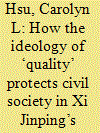| Srl | Item |
| 1 |
ID:
187922


|
|
|
|
|
| Summary/Abstract |
Citizenship education has been an explicit part of the universal education system in contemporary China. Using data from an original nationwide survey conducted in 2018, this study tests the hypothesis that the longer the intensity of exposure to citizenship education, the more citizens are influenced by a state-led conception of citizenship characterized by passive obedience and loyalty to the state. The study finds mixed results in that citizenship education is effective at lower educational levels, but at higher levels it is not only less effective, but instead may foster (or at minimum, does not deter) more active conceptions of citizenship.
|
|
|
|
|
|
|
|
|
|
|
|
|
|
|
|
| 2 |
ID:
178171


|
|
|
|
|
| Summary/Abstract |
Under Xi Jinping, the Chinese state has asserted authoritarian control over many aspects of civil society. Yet there is evidence that Chinese citizens are continuing to mobilize and organize with relative levels of success. This article examines one mechanism that prevents the Chinese state from eliminating civil society: the political ideology of suzhi (素质), translated as ‘quality’ in English. In the post-Mao era, the Chinese Communist Party (CCP) has increasingly invested its political legitimacy in its ability to deliver a rising quality of life to its citizens. This dynamic means that it is possible for Chinese citizens to mobilize and organize to achieve their goals. Suzhi ideology gives citizens one set of means to effectively limit undesirable behaviour by the state. It also provides citizens with leverage to make the state respond robustly to their needs and desires. It opens up possibilities for citizens to solve social problems on their own, without recourse to state actors. This article will examine four arenas of Chinese civil society which suzhi ideology protects under the Xi regime: media-inspired public outrage; public protests and demonstrations; NGOs as state consultants; and the increased accessibility of litigation.
|
|
|
|
|
|
|
|
|
|
|
|
|
|
|
|
| 3 |
ID:
139547


|
|
|
|
|
| Summary/Abstract |
This article uses an institutional approach to examine Chinese NGOs as an emerging organizational field. In mature organizational fields, the organizations are powerfully constrained to follow the institutional practices of that field. However, in an emerging organizational field, the institutionalized constraints are not yet established, so actors can try out a wide range of practices. Some of these practices will become the new “rules of the game” of the organizational field when it is established. The content of these rules will shape the relationship between NGOs and the Chinese party-state for future generations. We find that a Chinese NGO's resource strategy is shaped by two interacting factors. First, NGOs operate in an evolving ecology of opportunity. Second, the social entrepreneurs who lead Chinese NGOs perceive that ecology of opportunity through the lens of their personal experiences, beliefs and expertise. As a result, the initial strategies of the organizations in our sample were strongly influenced by the institutional experience of their founders. Former state bureaucrats built NGOs around alliances with party-state agencies. In contrast, NGO founders that had no party-state experience usually avoided the state and sought areas away from government control/attention, such as the internet or private business.
|
|
|
|
|
|
|
|
|
|
|
|
|
|
|
|